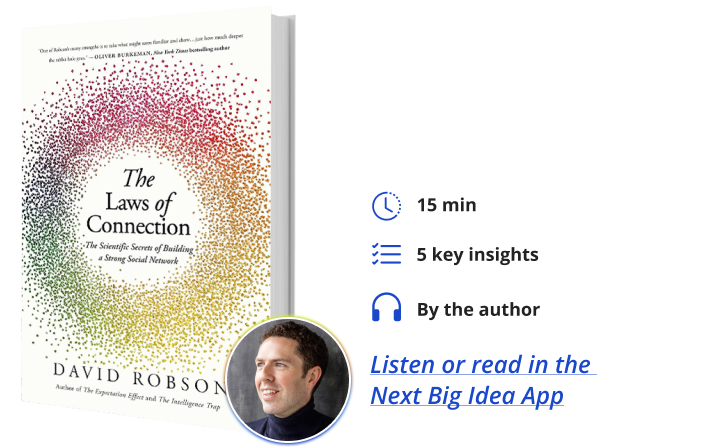David Robson is an award-winning science writer specializing in the extremes of the human brain, body and behavior. He has a degree in mathematics from Cambridge University and has worked at New Scientist and BBC Future. In 2021, David received awards from the Association of British Science Writers and the UK Medical Journalists’ Association for his writing on misinformation and risk communication during the COVID pandemic.
Below, David shares five key insights from his new book, The Laws of Connection: The Scientific Secrets of Building a Strong Social Network. Listen to the audio version—read by David himself—in the Next Big Idea App.

1. Don’t be a frenemy.
We all have purely supportive people in our social circles, the ones that you know will be there for you to help, the ones that very rarely hurt your feelings. Most of us will also know a few consistently unpleasant people, the ones best avoided. But what about the people in-between, those Jekyll-and-Hyde personalities who might act like your best friend one moment but lash out the next? What about the colleague that promises to be there for you in a crisis but ignores your emails when you need their help?
These people are commonly known as “frenemies,” but to scientists, they are called ambivalent relationships. Scientific research suggests that frenemies cause more damage to our health and happiness than purely aversive people, whom we can more easily discount. By blowing hot and cold, ambivalent frenemies leave us in a state of uncertainty and stress whenever we know we’re going to have to interact with them. Simply knowing that they are sitting in the next room can be enough to raise our blood pressure. By learning to recognize our frenemies, we can manage our expectations when we next see them, or even better, avoid them altogether. We can also analyze our own behavior and question whether we are unwittingly putting others into a state of stress with our unreliable behavior.
2. Overcoming the “liking gap.”
Have you ever enjoyed a pleasant conversation with a stranger, only to walk away and mull over all the clumsy things you think you said? If so, you might have suffered from a phenomenon called the “liking gap.” Research by Erica Boothby and colleagues at the University of Pennsylvania has shown that most of us consistently underestimate how much other people have enjoyed our company. After meeting a new acquaintance, each person walks away believing that they liked the other person more than the other person liked them. We are generally much more appealing than we believe, and the liking gap can persist after many meetings. College roommates have even reported these anxieties for the best part of an academic year.
The liking gap can discourage us from building on our rapport with someone to develop a strong, lasting friendship, even though the connection we crave is standing right in front of us. In the workplace, it can limit our potential for creative collaborations.
“Most of us consistently underestimate how much other people have enjoyed our company.”
You can overcome the liking gap with practice. Next time you meet someone you like and respect, be the first to say how much you enjoyed the conversation and suggest that you meet a second time. You must, of course, respect the other person’s wishes if they do not wish to build on your connection, but the research suggests they will likely respond far more warmly than you expect.
3. Practice self-disclosure and reveal your vulnerability.
Another psychological barrier concerns the content of our conversations. Thanks to our natural reserve, many of us stick to superficial subjects that leave little room to share our intimate thoughts and feelings. This is unfortunate since meaningful social connections can only emerge when two people share their inner worlds. Consider the following conversation prompts designed to encourage self-disclosure:
• “For what in your life do you feel most grateful?”
• “If a crystal ball could tell you the truth about yourself, your life, your future, or anything else, what would you want to know?”
• If you could undo one mistake you have made, what would it be, and why would you undo it?”
When asked to talk about these topics with a new acquaintance, most people worry that the conversation will be extremely awkward, compared to standard small talk about someone’s background or what they did on a public holiday. In reality, the conversations are far more enjoyable than expected and result in much greater closeness than shallow chit-chat. We are particularly wary of revealing fears and vulnerabilities, and things we fear will make us look weak, but in reality, people tend to see courage and honesty as a phenomenon called the “beautiful mess effect.” By practicing greater self-disclosure in our lives and exposing our authentic personalities, we can put ourselves on the fast track to deeper friendships.
4. Don’t fear bragging, and embrace mitfreude.
It’s not just our weaknesses that we hide. Whether we have won a professional award or simply achieved a personal best at the gym, many of us avoid sharing good news for fear that it will provoke jealousy. No one, as we have been repeatedly told, likes a show-off.
This advice has a strong historical precedence. “If you want people to think well of you, do not speak well of yourself,” the 17th-century mathematician and philosopher Blaise Pascal wrote in his Pensées. However, modesty is rarely rewarded; in general, other people view our attempts to hide our achievements as paternalistic behavior. It’s as if we expect people we tell about our achievements to react like a spoiled child who always has to win a board game or they’ll throw a tantrum. That feels very insulting, driving a wedge between us and the other person.
“In general, other people view our attempts to hide our achievements as paternalistic behavior.”
“Humblebragging,” the act of veiling a success with a complaint, fails for similar reasons. To have a successful interaction with someone, you need to know that they are acting honestly, but humblebrags suggest that someone is making too much effort to manage others’ impressions. Similarly, someone who says, “I am so sick of being mistaken for a celebrity” is considered to be less sincere, and less likeable, than someone who simply says, “I’m often mistaken for a celebrity.”
Humblebrags often do not even convey the qualities we wish to show off. Someone who says, “I am so exhausted of getting elected to leadership positions,” is considered to be less competent than someone who says, “I get elected to leadership positions.” When we openly acknowledge our achievements, we create opportunities for mitfreude, the pleasure that comes from rejoicing with others. Mitfreude is the benign cousin of schadenfreude, our happiness at others’ misfortune, and it can be a powerful way of creating a deeper connection.
5. Don’t fear asking for help, engage in amae.
When we have a difficult problem to solve, far too many of us struggle alone rather than seeking support. We fear that others will see our request as a burden and that they will either reject our entreaty or quietly resent it, that the mere act of asking will make us look weak. Once again, research shows that these preoccupations are mostly unfounded. Scientists have investigated people’s attitudes to helping over a huge range of tasks, from asking for directions to collecting money for charity: people are roughly twice as likely to assist us than we expect.
We should, of course, always be mindful of the responsibilities someone may be carrying and accept a refusal with good grace. However, many people will be genuinely happy to help if our requests are sensitive and respectful. In many cases, asking for a favor can be a bonding experience since it emphasizes your trust and respect for the other person. Studies show that when you ask someone for assistance, even if it is a task you could feasibly do by yourself, it primes the other person to feel closer to you. The Japanese language has a concept for this, amae, and many of us would be happier if we applied it more in our lives.
To listen to the audio version read by author David Robson, download the Next Big Idea App today:





























